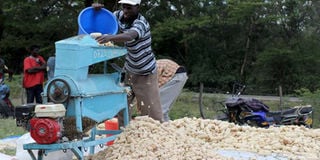My formula for making money from maize

David Njoroge shells maize for farmers in Muhoroni earlier this month. He moves from one region to another doing the work for farmers, many of whom are moving away from the tedious manual shelling. PHOTO | TOM OTIENO | NATION MEDIA GROUP
What you need to know:
- The businessman moves from one region to another doing the work for farmers, many of them who are moving away from the tedious manual shelling.
- Before 2011, Njoroge was a full-time maize trader, buying the produce from farmers and selling to consumers at a small fee.
- Before grinding the maize, he ensures that it is well dried, so that the moisture does not affect the machine. The recommended moisture content is 13.5 per cent.
- Njoroge has employed two workers who help him in processing and collection of grains.
The blue machine made a loud, cracking noise as it gobbled up several maize cobs on a farm somewhere in Muhoroni, Kisumu County.
David Njoroge, the owner, fed into the diesel-powered sheller more and more maize cobs as it took some seconds before emptying the maize belonging to farmer Judith Atieno into a gunny bag and pushing the cobs on the ground.
In about two minutes, the sheller had filled a 90kg bag of maize.
“The shelling speed is 300 revolutions per minute, though I adjust depending on the work load. The sheller does not destroy the maize kernel and cobs come out full,” said Njoroge, who Seeds of Gold team met early this month in Muhoroni where he had visited for the job.
The businessman moves from one region to another doing the work for farmers, many of them who are moving away from the tedious manual shelling. “I have two machines, this is the smallest, the other one is too bulky. Not all of us can be farmers, so I choose this path,” he said.
Before 2011, Njoroge was a full-time maize trader, buying the produce from farmers and selling to consumers at a small fee.
However, he switched to the new business where there is little competition after attending training at Kenya Industrial Research and Development Institute in Kisumu.
“During the training, I was taken through how the machine is fabricated and how it works. I later bought mine.”
Soon after harvesting, many farmers used to employ people to shell maize using their bare hands with the exercise dragging for days and costing more, but things are changing giving people like Njoroge business.
Before grinding the maize, he ensures that it is well dried, so that the moisture does not affect the machine. The recommended moisture content is 13.5 per cent.
MOISTURE CONTENT OF THE MAIZE
“If maize has plenty of moisture, it sticks on the grinder affecting the sheller and this has to be corrected before next use, which costs money,” said Njoroge, noting he uses two litres of petrol to shell 20 to 30 90kg bags of maize.
It costs about Sh200 to shell maize with bare hands. On the other hand, Njoroge shells a 90kg bag of maize at a minimum of Sh100 and on average works on 100 bags a day.
“I deal with small farmers and charge them differently depending on the distance. I stay in Molo, therefore, if I travel to Muhoroni for the work, I charge Sh200 per bag because of the distance,” said Njoroge, adding the sheller is portable and can be carried in a public service vehicle.
Besides Muhoroni, he travels to Eldoret during the harvesting season where he shells up to 200 bags a day, with the peak season starting August to December.
During the period, maize prices are usually down, therefore, traders like him do not make good money. He sells maize during the other months and also farms the crop.
A sheller can be readily acquired from several farm machinery dealers across the country from Sh50,000, depending on the speed and capacity. His challenges include being unable to shell maize during the rainy season.
“During rainy season maize does not dry well, which increases chances of the machine spoiling due to the high moisture level,” said the farmer who depends on referrals to get customers, with the work taking him to Mombasa and Uganda.
Njoroge has employed two workers who help him in processing and collection of grains.
Prof Mathew Dida of School of Agriculture, Tom Mboya University College in Homa Bay, says the business needs a good market survey for sustainability as the trader would know which region to visit next.





